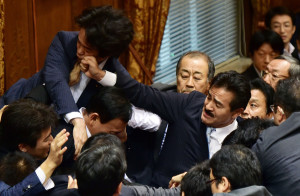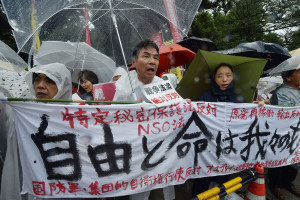Barack Obama and the Powell Doctrine, Reconsidered
Leaving troops in Afghanistan is the right thing to do. It is also a telling, sad legacy for the U.S. president.

President Barack Obama was elected to extricate the United States from Iraq and Afghanistan. It is a sad irony of his presidency that among his foremost foreign-policy legacies will be leaving American involvement in both countries as among the first and most complex challenges his successor will face.
The president’s decision to leave 5,500 troops in Afghanistan at least into the first year of the next president’s term of office was inevitable. The lessons of Iraq and the volatile situation on the ground in Afghanistan dictate it. It was also the right decision. To leave entirely would be to invite chaos, render America’s enormous investment a write-off, and likely leave the country a home to a new generation of violent extremists even more dangerous than the al Qaeda thugs whom America entered Afghanistan to eradicate.
In reaching this decision, Obama is helping to put to rest one of the most often cited aspects of the Powell Doctrine, the framework for considering American overseas interventions that was named after the former secretary of state. The doctrine traces its roots to Colin Powell’s former boss, Secretary of Defense Caspar Weinberger, and to the deep desire to avoid future Vietnams that dominated the thinking of American military planners in the wake of that debacle. One of its central precepts is that when America contemplates overseas use of force, an “exit strategy” is developed to avoid the prospect of being bogged down, as in the so-called quagmire of the Indochina War.
It is a natural desire. Protracted, bloody, costly engagements are undesirable on almost every level. Unfortunately, history has shown that in many circumstances avoiding them is unrealistic. In fact, the lesson of the past three-quarters of a century of U.S. overseas military action might be seen as “do not intervene unless you are prepared to remain involved for a long, long time.”
What are the notable “successes” of America’s major wars during that period? Defeating Germany and Japan? Ensuring the freedom of Korea?
In each case, troops have remained on the ground in those countries for more than half a century. In none of these cases did this mean the United States had to be an imperial power. But it did mean that Washington had to accept that troops served an important stabilizing role that could not be otherwise provided. Needless to say, other longer-term interests were also involved in all these circumstances — particularly, counterbalancing Cold War adversaries. But this justification underscored a common-sense corollary to the “be prepared to stay” doctrine that is experience’s real lesson: Don’t intervene unless your long-term interests warrant long-term involvement.
This altered approach should actually be embraced by more anti-war elements in American society — as well as by those who support a strong military. It eliminates the illusion that “in and out” or “low cost” interventions are really options in any situation where the goal is more than of a very limited, tactical nature. As a consequence, it argues even more forcefully than the Powell Doctrine that involvements be weighed carefully and undertaken infrequently.
It is not necessary, of course, that the United States act alone in such interventions. Nor is it required that the long-term commitment of troops to a country be wholly, primarily, or even partially a U.S. obligation. But an effective stabilizing force needs to be present — particularly in a situation where the intervention is meant to address threats that have emanated from local problems that have a long history or have otherwise been protracted in nature. Even overwhelming application of military force can’t undo history, culture, or structural problems with deep roots. Indeed, there are certain circumstances where stabilization is just not a possible outcome, and we must plan for those accordingly, limiting our objectives. As my colleague Tom Ricks has suggested, in Afghanistan this might have meant focusing on securing the area around greater Kabul and not seeking to venture further to try to secure what few Afghan governments ever could.
Another conclusion, and a lesson that must be particularly bitter for the president, is that the long-term stabilizing role can only be undertaken by a truly capable force. The president has frequently argued that a centerpiece of his plans to extricate America from its involvements in Iraq and Afghanistan was turning such responsibilities over to local militaries. But in both cases, even after huge investments in training and equipping local forces, America has failed to adequately cultivate forces to which the baton can be handed off.
Given the evidence that was at hand when the president made such transfers of responsibility core to his plans for Iraq and Afghanistan — and fighting extremism more broadly — his conclusion that such an approach could work was at best folly. Probably, it was worse than that: bordering on deep intellectual dishonesty. It was an approach based largely on denial and self-deception.
Now it is clear that it has not only failed — it has done so catastrophically. In fact, it is largely the degree of the failure in Iraq (which, as probably should no longer need to be pointed out, was precipitated by the George W. Bush administration’s deeply misguided intervention in that country) that has obligated the president to leave troops in Afghanistan. With recent gains by the Taliban and the Islamic State in Afghanistan and the continuing bumbling and revealed failings of the government in Kabul, simply pulling out would have produced a second mess like the one that has made the situation in Iraq and Syria such a giant threat to regional and international stability.
Of course, not all of the common-sense precepts of the Powell Doctrine have been invalidated by our recent experiences. We must still weigh whether vital interests are at stake, whether clear objectives exist, whether potential costs have been assessed, whether other means of resolving have been exhausted, whether we are willing to apply sufficient force and resources to ensure the outcome we seek, and whether the consequences of the potential action have been fully assessed. Other concepts associated with the doctrine — that action be supported by the American people and also by the international community — are more debatable; there are clearly circumstances in which national interests may trump either of these otherwise desirable criteria.
It is important to note that this does not mean we should never intervene. It means going in with our eyes wide open, knowing what we are getting into.
Colin Powell is one of the most sensible men I have met in Washington, and I don’t dismiss even one of the conclusions of his great service and experience lightly. Fortunately, he has also provided us with a thought to replace the language about exit strategies (which, like broad public and international support, falls in the category of “hoped for” conditions), which perhaps may be his most famous pronouncement regarding the American use of force abroad. Because if the Obama and Bush years and Iraq and Afghanistan have taught us one thing, it is this: “If you break it, you own it.” With the president’s recent decision, it is clear he and we are now owning that.
Photo credit: Alex Wong/Getty Images
In: foreignpolicy


